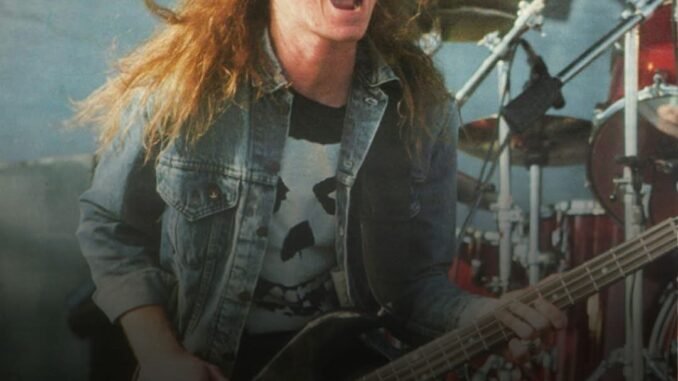
Today We Honor Cliff Burton’s Legacy: Remembering the Metallica Legend on the 39th Anniversary of His Tragic Passing
September 27, 1986, remains one of the darkest days in the history of heavy metal. On that fateful morning, Cliff Burton, the gifted bassist of Metallica, lost his life in a tragic bus accident in Sweden while on tour. Thirty-nine years later, the memory of Burton continues to burn brightly in the hearts of fans, musicians, and the countless lives touched by his artistry. Today, the metal world pauses to honor not just his untimely death, but the timeless legacy he left behind.
Cliff Burton joined Metallica in 1982, at a time when the band was still carving its identity in the burgeoning thrash metal scene. From the very first notes he played, Burton brought a dimension to the group that was both raw and revolutionary. His classically trained background, combined with a love for hard rock and punk, gave him a unique voice on the bass guitar. He played with distortion, wah pedals, and harmonics that elevated the bass from a supporting instrument into a driving creative force.
On Metallica’s first three studio albums—Kill ’Em All (1983), Ride the Lightning (1984), and Master of Puppets (1986)—Burton’s fingerprints are everywhere. His thunderous yet melodic bass lines powered tracks like For Whom the Bell Tolls, while his haunting instrumental (Anesthesia) Pulling Teeth showcased both his technical mastery and his daring spirit. His influence extended far beyond bass playing; he was deeply involved in songwriting and pushed the band to experiment with more complex arrangements, harmonies, and lyrical themes. Without Burton’s vision, Metallica might never have evolved into the global juggernaut they became.
Tragically, his journey ended in the early hours of September 27, 1986, near Ljungby, Sweden, when the band’s tour bus skidded on icy roads and overturned. Burton, just 24 years old, was thrown from the vehicle and killed instantly. The shock was devastating—not just for Metallica, who lost a brother and creative partner, but for the entire heavy metal community. Fans who had witnessed his genius on stage were left grappling with the cruel reality of what could have been.
In the aftermath, Metallica chose to carry on, recruiting Jason Newsted as their new bassist. Yet even as the band grew to stadium-filling heights and cemented their place in music history, Burton’s presence never faded. His bandmates continued to speak of him with reverence, often acknowledging how his spirit and influence guided their path. James Hetfield once remarked, “Cliff was our foundation. He taught us to be ourselves and to never back down from what we believed in.”
Nearly four decades later, Burton’s impact continues to inspire new generations of musicians. Bassists across genres cite him as a formative influence, from metal veterans to modern progressive artists. His fearless experimentation paved the way for a new understanding of what the bass could achieve in heavy music. Even outside of metal, Burton’s style resonates—his blending of classical knowledge with heavy aggression remains a model of innovation.
Each year, fans gather online and in person to commemorate his life. In 2009, Cliff Burton was posthumously inducted into the Rock and Roll Hall of Fame as part of Metallica, with his father Ray Burton accepting the honor on his behalf. Ray, until his own passing in 2020, was a tireless advocate for his son’s legacy, often meeting fans and expressing gratitude for the love shown to Cliff.
Today, on the 39th anniversary of his passing, the memory of Cliff Burton is not one of tragedy alone, but of brilliance, passion, and authenticity. He lived as he played—fearlessly, uncompromisingly, and with a spirit that continues to echo in every riff, every stage dive, and every fan headbanging to Metallica’s music.
Though his time was cut heartbreakingly short, his influence remains eternal. Cliff Burton is not just remembered—he is revered.
Leave a Reply